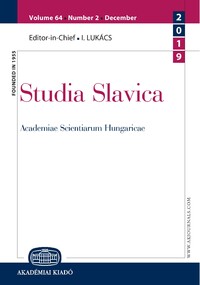Валентнісні характеристики акціональних та процесуальних дієслів у мові та мовленні (порівняльний аспект)
Valence Characteristics of Action and Procedural Verbs in Language and Speech (A Comparative Aspect)
Author(s): Olesia SulymaSubject(s): Semantics, Eastern Slavic Languages
Published by: Akadémiai Kiadó
Keywords: valence; agent; subject; object; locus; temporative; causative; process; actionality
Summary/Abstract: The paper deals with the specificity of the valence characteristics of the action and procedural verbs in language and speech. Modern linguistic research is aimed primarily at the functioning of language units at different levels. However, the valence characteristics of lexical and grammatical categories of words, in particular verbs, are studied in terms of formal and semantic features, often without distinguishing the specifics of the manifestation of this category in language and speech. The proposed study is based on the results of questionnaires of respondents, which allows us to draw conclusions about the specifics of the valence of verbs in language and speech. The purpose of the study is to establish the differences between the perception of valence characteristics of verbs in language and speech, and to outline the specifics of the influence of the semantics of the subject syntaxeme or the absence of this syntaxeme on the establishment of the number of obligatory components in the structure of a simple sentence. The following methods were used in the research: questionnaire (to obtain the actual research material); unattended observation (to establish the specifics of valence characteristics of impersonal verbs); descriptive (to inventory the results of the questionnaire, in particular the description of individual groups of verbs and their valence in context and outside it); contextual analysis (to establish seme, actualized by a narrow context), and statistical analysis (to establish the relationship between the valence characteristics of verb forms in the context and outside it). The valence of verbs in the context and outside it is distinguished by a) the number of open valence positions; b) the quality of obligatory components for the formation of the general meaning of the sentence. The number of open positions is influenced by the specifics of the use of the verb in the personal or impersonal utterance. Personal verbs used in the impersonal sense lose part of the open valence positions, acquiring the semantics of the actual procedurality. At the same time, the majority of respondents defined such verbs as actionality out of the context. The semantics of the subject, particularly in the aspect of the category “being / non-being”, has less effect on the number of open valence positions but has a greater effect on the quality of the required components. In particular, the subject-non-being actualizes mainly the circumstantial semantics of the distributors in terms of the specifics of the process, in particular its course, time constraints, the space where the process takes place, and so on.
Journal: Studia Slavica Academiae Scientiarum Hungaricae
- Issue Year: 65/2020
- Issue No: 2
- Page Range: 363-376
- Page Count: 14
- Language: Ukrainian
- Content File-PDF

